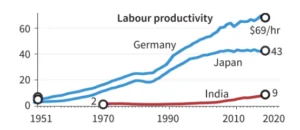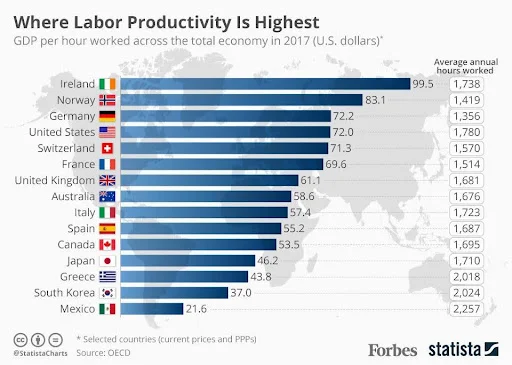Introduction
- Narayana Murthy, the co-founder of Infosys, has justified his statement about a 70-hour workweek.
- Narayan Murthy’s suggestion for a 70-hour workweek draws inspiration from the post-World War II era in Japan and Germany, where extended work hours were seen as a crucial factor in boosting productivity and helping the economies recover. Murthy argues that India can achieve similar economic success by encouraging workers to put in longer hours.
- However, while Japan and Germany increased their working hours to about 2,200–2,400 annually (roughly 8-9 hours per day), Murthy’s proposed 70-hour workweek would require employees to work 14 hours every weekday. This is significantly higher than what Japan and Germany experienced, raising concerns.

What is Productivity and Its Types?
- Productivity is a key economic measure that gauges how efficiently inputs—like labor, capital, and resources—are used to produce outputs such as goods and services.
- Simply put, it measures the effectiveness of production.
- Improving productivity means more goods and services can be produced with the same or fewer resources, contributing to economic growth and development.
Read also: Ken-Betwa River Linking Project: Key Facts for UPSC Preparation
Types of Productivity
- Labor/Work Productivity: Labor productivity measures the output produced per hour of work. For example, if a country’s GDP is $1 trillion and its workforce contributes 20 billion hours of work, the labor productivity is $50 per hour. This metric is closely tied to higher wages, better living standards, and greater consumer purchasing power.
- Capital Productivity: Capital productivity assesses how effectively physical assets such as machinery, buildings, and equipment are used in production. Efficient use of capital leads to increased profitability and greater competitiveness in the global market.
- Total Factor Productivity: Total factor productivity measures the efficiency with which all inputs (labor, capital, etc.) are combined to produce outputs, reflecting innovations, technological advancements, and efficiency improvements in production processes.

India’s Labor Productivity
- India’s hourly output currently stands at $8.47, according to the International Labour Organization (ILO).
- This is significantly lower compared to countries like France, where the hourly output is $58. Additionally, Indians work an average of 48 hours per week—much higher than in countries like France, where the average workweek is around 30 hours.
Working Hours for Young Indians
- The 2019 Time Use Survey reveals that young people in India (aged 15-29) work an average of 7.2 hours per day in rural areas and 8.5 hours in urban areas.
- States like Uttarakhand report even higher working hours, with young people working an average of 9.6 hours per day in urban areas.
Narayan Murthy’s Argument for a 70-Hour Workweek
- Boosting Productivity: Proponents argue that longer work hours can lead to higher productivity by giving employees more time to complete tasks, especially in sectors where the need for extended work is prevalent, such as technology and finance. Japan and Germany saw productivity increases after extending work hours in the past, making this a key point of support for Murthy’s suggestion.
- Accelerating Economic Growth: With more work hours, India could potentially increase its output, contributing to overall economic growth. This could help India reach its target of becoming a $5 trillion economy and improve its global economic standing.
- Improved Global Competitiveness: As economies become more interconnected, longer work hours could help Indian professionals stay competitive internationally. This is particularly relevant in industries like finance, where the global workforce operates around the clock.
- Increased Tax Revenues: More working hours could lead to higher incomes, which would boost tax revenues. These additional funds could then be used to improve public services and infrastructure, creating a positive cycle of economic growth.
- Skill Development Opportunities: Advocates argue that working longer hours could give individuals the chance to develop their skills. For example, workers could allocate part of their 70-hour workweek to personal skill-building activities, fostering expertise in their respective fields.
- Harnessing India’s Demographic Dividend: India has a young, vibrant workforce. Proponents of the 70-hour workweek see it as an opportunity to channel this demographic dividend into nation-building, enabling India to leverage its youthful workforce for economic and social development.
Arguments Against the 70-Hour Workweek
- Declining Productivity After 50 Hours: Research shows that productivity begins to decline significantly after 50 hours of work per week and continues to drop after 55 hours. In fact, countries with shorter workweeks, like those in Scandinavia, have some of the highest productivity rates in the world, challenging the idea that longer hours necessarily lead to better results.
- Burnout and Mental Health Concerns: Extended work hours contribute to burnout, stress, and mental health problems. Prolonged overwork can lead to fatigue, anxiety, and depression, which negatively affects both productivity and employees’ well-being.
- Higher Healthcare Costs: Stress-related health problems become more prevalent among employees working long hours. These health issues not only harm workers but also increase healthcare costs for employers and the government.
- Disruption of Family and Social Life: Long working hours can strain personal and family relationships, leading to a negative impact on work-life balance. Employees may struggle to meet family obligations or engage in social activities, which can affect their overall happiness and well-being.
- Decreased Creativity and Innovation: Creativity and innovation thrive in environments where employees have time to rest, reflect, and think critically. Overworked employees are more likely to experience fatigue, which hinders their ability to think outside the box and solve problems creatively.
- Quality of Work Deterioration: Longer hours do not always translate to better work. Tired workers are more prone to making mistakes, leading to lower quality and errors, which could negate any productivity gains.
- Exacerbation of Gender Inequality: Women, who often bear the brunt of domestic and caregiving duties, are disproportionately affected by extended work hours. This could further exacerbate gender inequalities in the workplace, limiting women’s career growth and personal well-being.
- Potential for Worker Exploitation: Extended work hours could lead to exploitation by employers, with employees being forced to work overtime without appropriate compensation or in substandard conditions.
- Negative Social Impacts: Longer work hours reduce the time employees can dedicate to community engagement or social activities. This could weaken social bonds and negatively impact the overall cohesion of society.
Way Forward
- Technological Adoption: India must invest in automation, artificial intelligence, and other advanced technologies to streamline production processes. By automating routine tasks, businesses can reduce the workload on employees while still increasing productivity.
- Skills Enhancement: The Skill India Mission should be better implemented to ensure workers are equipped with the necessary skills to thrive in a rapidly changing job market. A skilled workforce can perform tasks more efficiently, leading to higher output with less effort.
- Infrastructure Improvements: Enhancing transportation infrastructure can reduce commute times, allowing workers to spend more time on productive activities. Improved infrastructure also makes it easier for workers to reach their workplaces, increasing overall productivity.
- Encouraging Innovation: Research and development (R&D) should be actively promoted across industries. Innovation can drive efficiency, improve product quality, and increase productivity, all while maintaining a healthy work-life balance for employees.

